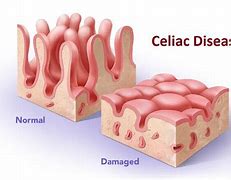Celiac disease, sometimes called celiac sprue or gluten-sensitive enteropathy, is an immune reaction to eating gluten, a protein found in wheat, barley and rye.
If you have celiac disease, eating gluten triggers an immune response in your small intestine. Over time, this reaction damages your small intestine’s lining and prevents it from absorbing some nutrients (malabsorption). The intestinal damage often causes diarrhea, fatigue, weight loss, bloating and anemia, and can lead to serious complications. Celiac Disease Foundation states “It is estimated to affect 1 in 100 people worldwide. Two and one-half million Americans are undiagnosed and are at risk for long-term health complications.”.
When the villi get damaged, nutrients cannot be absorbed properly into the body.
-
Intestinal villi are tiny, finger-like projections made up of cells that line the entire length of your small intestine. Your villi (villus is the singular, villi is the plural) absorb nutrients from the food you eat and then shuttle those nutrients into your bloodstream so they can travel where they’re needed.
Celiac disease is hereditary, meaning that it runs in families. People with a first-degree relative with celiac disease (parent, child, sibling) have a 1 in 10 risk of developing celiac disease.
Celiac disease can be difficult to diagnose because it affects people differently. There are more than 200 known celiac disease symptoms which may occur in the digestive system or other parts of the body. Some people develop celiac disease as a child, others as an adult. The reason for this is still unknown.
Celiac disease can develop at any age after people start eating foods or medicines that contain gluten. Left untreated, celiac disease can lead to additional serious health problems. Some people with celiac disease have no symptoms at all, but still test positive on the celiac disease blood test. A few others may have a negative blood test, but have a positive intestinal biopsy. However, all people with celiac disease are at risk for long-term complications, whether or not they display any symptoms.
Long Term Problems that can arise from celiac disease are the following:
- Iron deficiency anemia
- Early onset osteoporosis or osteopenia
- Infertility and miscarriage
- Lactose intolerance
- Vitamin and mineral deficiencies
- Central and peripheral nervous system disorders
- Pancreatic insufficiency
- Intestinal lymphomas and other GI cancers (malignancies)
- Gall bladder malfunction
- Neurological manifestations, including ataxia, epileptic seizures, dementia, migraine, neuropathy, myopathy and multifocal leucoencephalopathy


